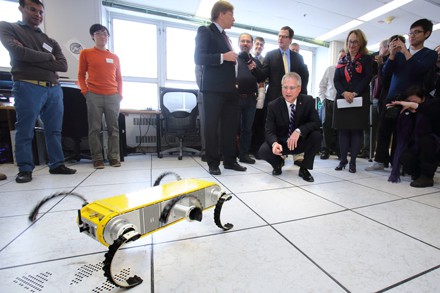

Robotics are big news these days, but for what some think are the wrong reasons. The explosive expansion of the United States drone program since 2008 has become a hot-button issue in 2013, taking ink away from the marvel that is the Mars Curiosity Rover.
While the federal injection of $5 million into NSERC’s Canadian Field Robotics Network, announced Friday at McGill University, will probably have defence applications, the money is intended to expand the role of robotics in daily life, exploring their uses as extensions of human capacity, from artificial hands for grasping objects out of the reach of the handicapped or elderly to exploring territory in Canada’s far north.
“McGill’s innovation and excellence in this field depends on such strategic funding, which supports researchers in developing intersectoral, international collaborations, and broadens the impact of their cutting-edge research, regionally, nationally and globally,” said Prof. Heather Munroe-Blum, McGill Principal and Vice-Chancellor.
The immediate announcement of $5 million was for the NCFRN’s 11 research labs spread across eight universities nationwide, with an additional $5 million to come for research support in the form of in-kind exchanges and direct financial support from industrial and governmental partners. There will also be $1.3 million for McGill researchers to support nine projects over the next five years.
“The students trained by this network are going to benefit from this rich multi-disciplinary academic environment and the exposure to the range of industrial drivers that are going to make this all come together,” said network head Greg Dudek, at the press conference. “They’ll be the masters of this new technology.”
At least as interesting as the current initiative’s goal of building robots to wander around autonomously in harsh conditions is the emphasis on having these robots not only communicate with each other, but also collaborate when necessary. An example would be to have both swimming and flying robots measuring icebergs, which are notoriously difficult to monitor with current satellite technology. This will no doubt dovetail nicely with the 2018 launch of Canada’s RADARSAT Constellation program, also meant to closely monitor Canada’s shores and Arctic region.
The creation of the Field Robotics Network and its emphasis on robots collaborating was perhaps inspired by an academic culture in which researchers are more used to competing with each other over limited funds than collaborating with each other. “There’s always a temptation to compete, but it’s better to collaborate against the challenges facing you,” said Dudek, citing competition for contracts from Japan, South Korea, the European Union and the United States as the primary challenge for Canadian researchers.
The worldwide robotics industry was $25 billion in 2010 and projected to reach $66 billion by 2025.
___________________
Leave a Reply
You must be logged in to post a comment.



 Share
Share Tweet
Tweet Share
Share




Comment